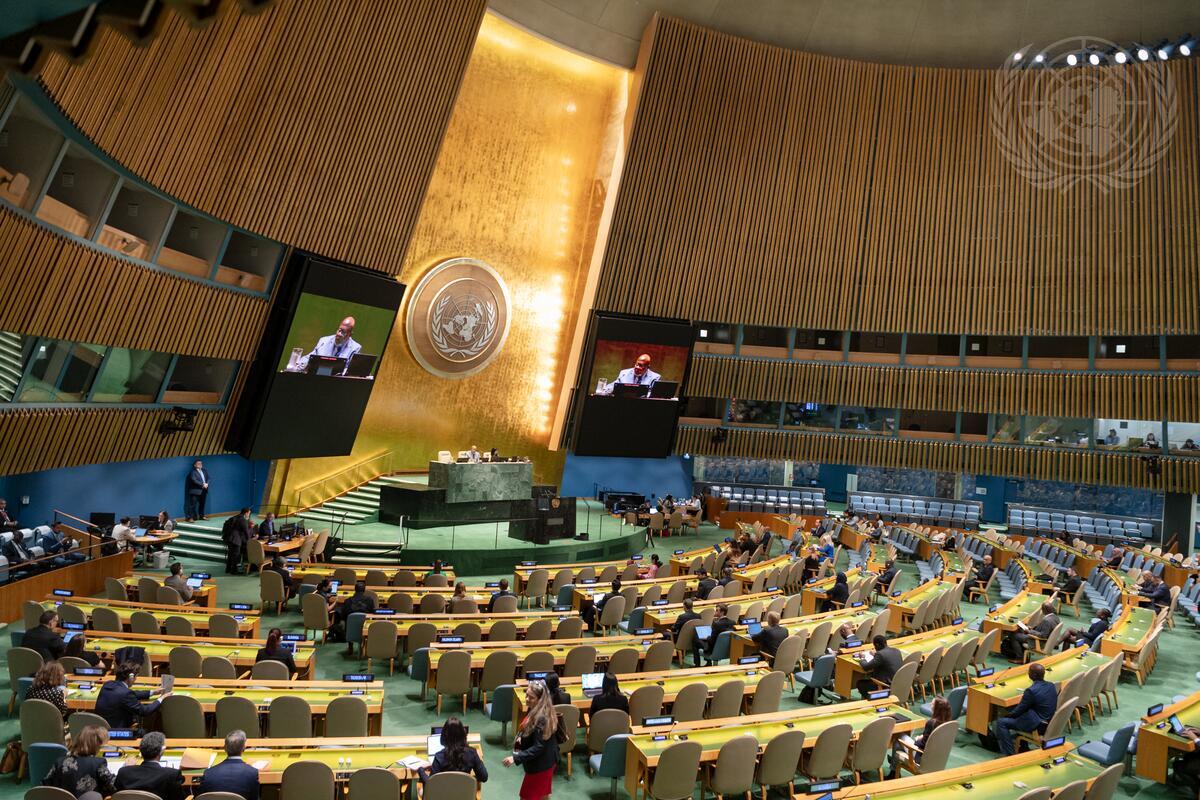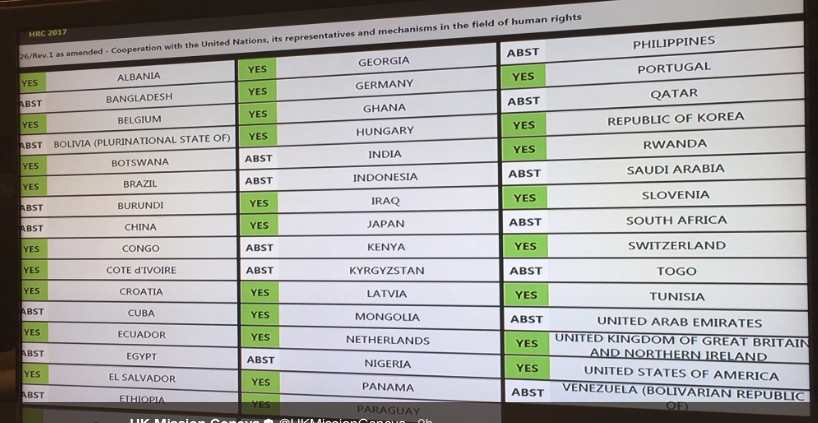The resolution led by the core group – comprising Ghana, Hungary, Ireland, Fiji and Uruguay – and sponsored by 55 States[1] from all regions affirms the right of all people to safe and unhindered access to and communication with international human rights bodies; a right established in international law.
Prior to the vote, 50 NGOs from all over the world called on Member States of the Council to support the resolution and reject a series of 19 hostile amendments led by China, Egypt, India, Russia and Venezuela, designed to seriously undermine the ability of the United Nations system to address the human rights situation on the ground. Each of those States has been accused of perpetrating reprisals by the UN Secretary-General and UN experts in recent years.
The worsening incidence of reprisals – with increased reports of intimidation, attacks, enforced disappearances and torture against those seeking to engage with the United Nations – is a clear indication that more needs to be done.
‘The establishment of a dedicated dialogue within the UN Human Rights Council will increase the visibility of acts of intimidation and reprisals, provide a platform to denounce and seek accountability for such acts, and increase the political cost for perpetrators,’ said ISHR Legal Counsel Tess McEvoy.
The need for further measures to ensure accountability for reprisals was reaffirmed this session by the ongoing lack of investigation or follow up in relation to the detention and subsequent death of Chinese human rights defender Cao Shunli in association with her Universal Periodic Review advocacy four years ago, and new cases such as the arbitrary detention of Egyptian human rights defender Ibrahim Metwally to prevent and punish his engagement with the UN Working Group on Enforced and Involuntary Disappearances.
Responsibility of various stakeholders to address reprisals
The resolution recognises the commitment made by UN Member States, in particular Council Members, to cooperate with the Council and its mechanisms, and the acknowledgment that a failure to take steps to prevent, investigate and ensure accountability for such acts may be inconsistent with that obligation.
Crucially, the resolution acknowledges the responsibility of various stakeholders to take action on reprisals. It calls on States to take measures to prevent the occurrence of intimidation and reprisals, as well as on the Human Rights Council President and Bureau to address and follow up on allegations of acts of intimidation and reprisal.
Further, echoing calls made by the Secretary General, the resolution establishes an interactive dialogue on the issue of reprisals, providing a dedicated dialogue focused on ending reprisals.
Three hostile amendments to the text were passed
While there was cross regional support for the resolution by a number of Member States, with States including Albania, Belgium, Georgia, Germany, Ghana, Japan, Latvia, Netherlands, Panama, the Republic of Korea, Slovenia, Switzerland, UK and USA speaking in support of the resolution during the vote; disappointingly three out of the 19 hostile amendments were passed.
One such amendment inserted language stressing that information provided to the United Nations on cases of intimidation and reprisal should be ‘credible and reliable and must be thoroughly checked and collaborated’.
‘We are dismayed by comments made by some States presenting the amendments that cases included in the Secretary General’s report were ‘fabricated’ or ‘politically motivated’. The only thing that is fabricated or politically motivated, however, are the charges and false evidence used by States such as China and Russia to seek to silence defenders. And those States should be assured that despite their attempts to delegitimise human rights work, brave defenders will continue to communicate with the UN and speak truth to power’, said ISHR Director Phil Lynch.
Ultimately the resolution was strongly adopted, with 28 States voting in favour, 19 States abstaining and no States voting against.
‘We thank the Core Group and the many sponsors of the resolution for their leadership and for standing with civil society in its engagement with the UN. Unsurprisingly, a number of countries that abstained from supporting the text are those in which there have been ongoing, systematic efforts to restrict civil society and the right to communicate with the United Nations. The adoption of this strong, substantive resolution by an overwhelming majority sends a clear message that such restrictions will not be tolerated and must end’.
Next steps
Beyond the grave impact on the life of persons concerned and their relatives, intimidation and reprisals also constitute an attack on human rights, the rule of law, and on international and regional mechanisms themselves. ISHR calls on all governments to take concrete steps to implement this resolution and end acts of intimidation and reprisal.
[1] Andorra,* Australia,* Austria,* Belgium, Bosnia and Herzegovina,* Bulgaria,* Chile,* Croatia, Cyprus,* Czechia,* Denmark,* Fiji,* Finland,* France,* Georgia, Germany, Ghana, Greece,* Guatemala,* Haiti,* Hungary, Iceland,* Ireland,* Israel,* Italy,* Japan, Latvia, Liechtenstein,* Lithuania,* Luxembourg,* Malta,* Mexico,* Monaco,* Montenegro,* Netherlands, New Zealand,* Norway,* Panama, Paraguay, Peru,* Poland,* Portugal, Republic of Korea, Republic of Moldova,* Romania,* Slovakia,* Slovenia, Spain,* Sweden,* Switzerland, the former Yugoslav Republic of Macedonia,* Ukraine,* United Kingdom of Great Britain and Northern Ireland, United States of America, Uruguay*




